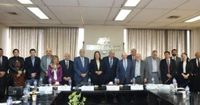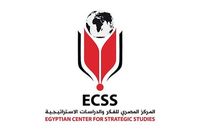In recent discussions surrounding the impact of U.S. tariffs on imports, Egyptian officials have expressed optimism about the country’s economic resilience. Dr. Abela Abdellatif, the Executive Director and Director of Research at the Egyptian Center for Economic Studies, emphasized that Egypt will not be significantly affected by the American tariffs, as the nation accounts for only 6% of U.S. imports. She highlighted the importance of optimizing Egypt's export capabilities, particularly in key sectors such as fertilizers, machinery, equipment, and electronics.
During a meeting held by the Egyptian Businessmen Association, various specialized committees reviewed the implications of the 10% tariffs imposed by the U.S. on certain goods. Dr. Abdellatif pointed out that approximately 81% of Egypt's export potential in fertilizers remains untapped, while 78% in machinery and electronics has yet to be fully utilized. This contrasts sharply with other countries like Canada, Mexico, and China, which are likely to experience more significant impacts from these tariffs.
Dr. Abdellatif stated, "There is no significant damage to Egypt, but it is a great opportunity to attract migrating investments in the industrial sectors." She noted that as major exporting countries respond to these tariffs with protective measures, it could inadvertently harm American consumers while benefiting less affected countries.
The Egyptian business community is keen on leveraging the ongoing global trade tensions to enhance export opportunities. However, Dr. Abdellatif stressed that this potential hinges on the government's ability to implement necessary reforms, streamline trade processes, and encourage foreign investment by reducing production costs.
Mohamed Qassem, head of the Egyptian Exporters Association, echoed these sentiments, suggesting that the tariffs could serve as a catalyst for change in production and supply chains that began to shift post-COVID-19. He remarked, "We must not be distracted from the great opportunity from global attention to localizing basic industries in developing countries, which gives Egypt a significant opportunity for growth. This trend will continue despite Trump's decisions."
Qassem further emphasized the need for improved investment and production strategies, alongside effective marketing initiatives. He pointed to the success of export-led growth models in various countries and advocated for an investment initiative aimed at boosting exports.
Ready-made garments emerged as a promising sector for Egypt, with Qassem noting that these industries are migrating from Asia and Turkey. He highlighted the need to prioritize land allocation for these industries in Upper Egypt, as well as in food production sectors.
Engineer Fadel Marzouk, Chairman of the Industrial Council for Ready-Made Garments, affirmed Egypt's competitive advantage in this sector. He reported an increase in foreign investments from countries like India, China, Turkey, and Vietnam, which has enhanced Egypt's readiness for export. In January and February 2025, the sector saw a remarkable 22% increase in export volume.
Marzouk also pointed out that the government has become more receptive to the needs of the garment industry, facilitating land allocation and easing customs procedures. He noted that operational changes, such as allowing ports to operate on weekends, have reduced logistical costs significantly.
Despite the optimistic outlook, concerns remain regarding the potential impact of tariffs on agricultural products. Engineer Mustafa Al-Najjari, head of the Crops and Irrigation Committee, warned that U.S. tariffs could affect local prices for soybeans and corn, both vital imports for Egypt. He stressed the importance of preparing alternatives and boosting local agricultural production to mitigate any adverse effects.
Alaa Sabaa, head of the Investment and Markets Committee, highlighted that the tariffs present an opportunity for Egypt to rethink its manufacturing strategies and remove obstacles to investment. He believes that this could encourage a more robust production environment across various sectors.
Moreover, Ahmed Moneir Ezz El-Din, first deputy head of the Industry and Scientific Research Committee, described the tariffs as a golden opportunity for attracting foreign investment, particularly from Chinese companies. He noted that inquiries from Chinese firms regarding potential partnerships have increased since the announcement of the tariffs.
As Egypt navigates these changes, the focus remains on enhancing its export capabilities while safeguarding local industries from potential market disruptions caused by foreign competition. The collective efforts of the Egyptian business community and government reforms are seen as crucial steps toward achieving sustainable economic growth in the face of evolving global trade dynamics.


